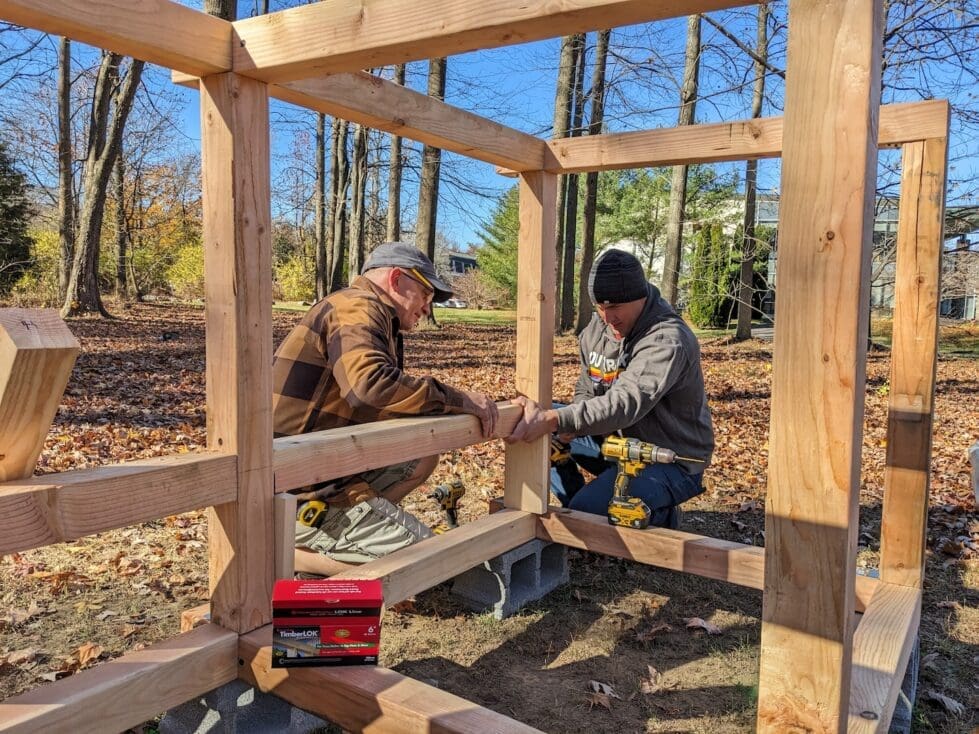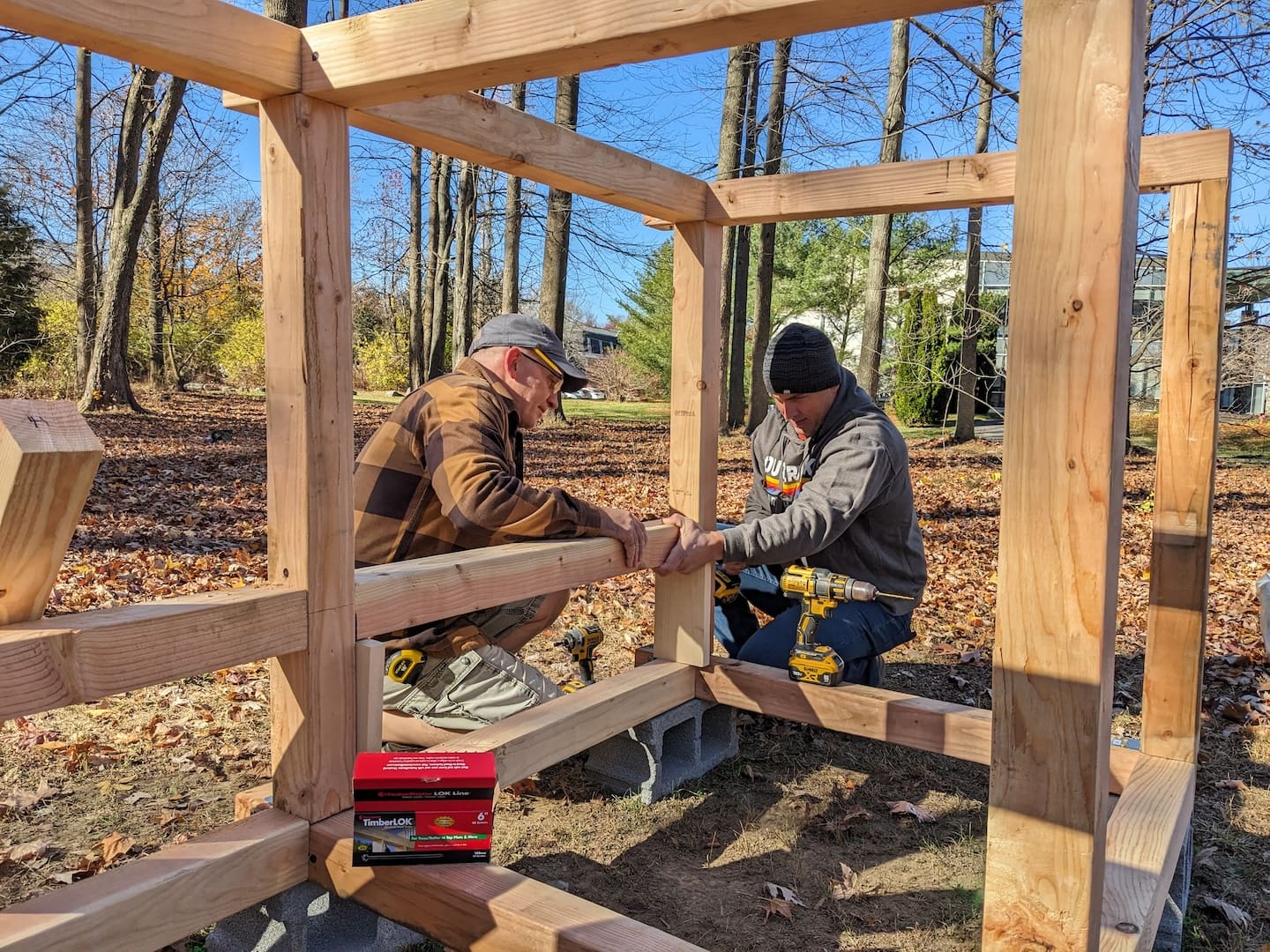

Jeff Towler, recruited through the Delaware Woodworkers Guild, and his friend Keith Stengel help create bins for the Delaware Community Composting Initiative. (Ken Mammarella photo).
Plastic Free Delaware, a group that formed a decade ago to get rid of environmentally unfriendly single-use bags, is now tackling something that forms a quarter of municipal waste: Food scraps.
It is creating its first community composting facility in Talley Day Park, behind the Brandywine Hundred Library, and prominently located right across a parking area from the playground.
The facility is for people who “want to compost your kitchen scraps, but don’t want to manage a backyard bin, or cannot for whatever reason, or you just like the social aspects of being in it together with others,” New Castle County Councilwoman Dee Durham wrote in her latest newsletter.
Durham is also on the board of Plastic Free Delaware, and the project is led for the group by Brigid Gregory. They met through the Delaware Recycling Public Advisory Committee.
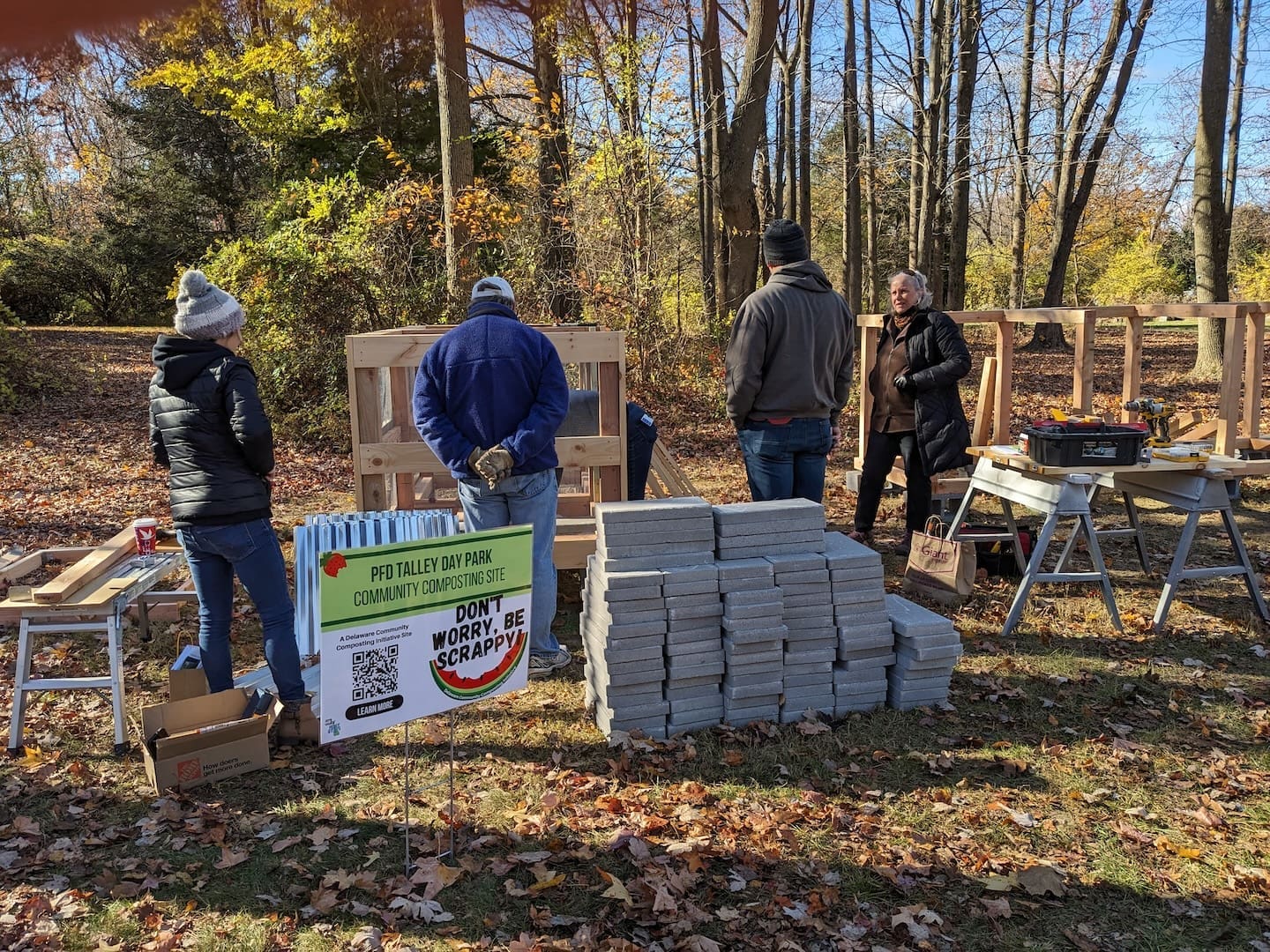

Plastic Free Delaware’s first community composting facility is in Talley Day Park. (Ken Mammarella photo)
Gregory and her husband, Andrew Trites, returned to Delaware in 2019. She has the education (a bachelor of science in energy, business and finance, with a minor in environmental inquiry, and a master of business administration in sustainability studies), the career background (four years at Johns Hopkins, as waste reduction and recycling coordinator) and the personal interest (a vermicomposting bin in a closet and a small composting tumbler in the back yard).
“Dee and I noticed a need for a community composting facility in Delaware,” she said. That realization led to “a lot of research into what might work and what is legal.”
DNREC’s Recyclopedia: Quick advice about what to recycle
Homeowners can easily compost on their property, but it took a year for the group to clear the $3,000 Talley Day facility with New Castle County and the Delaware Department of Natural Resources and Environmental Control.
The Delaware Community Composting Initiative has received funding – $27,000 the first year and $50,000 this year – from the New Castle County Conservation District, DNREC and the Delaware Solid Waste Authority, plus honorariums from speaking at events and in-kind donations.
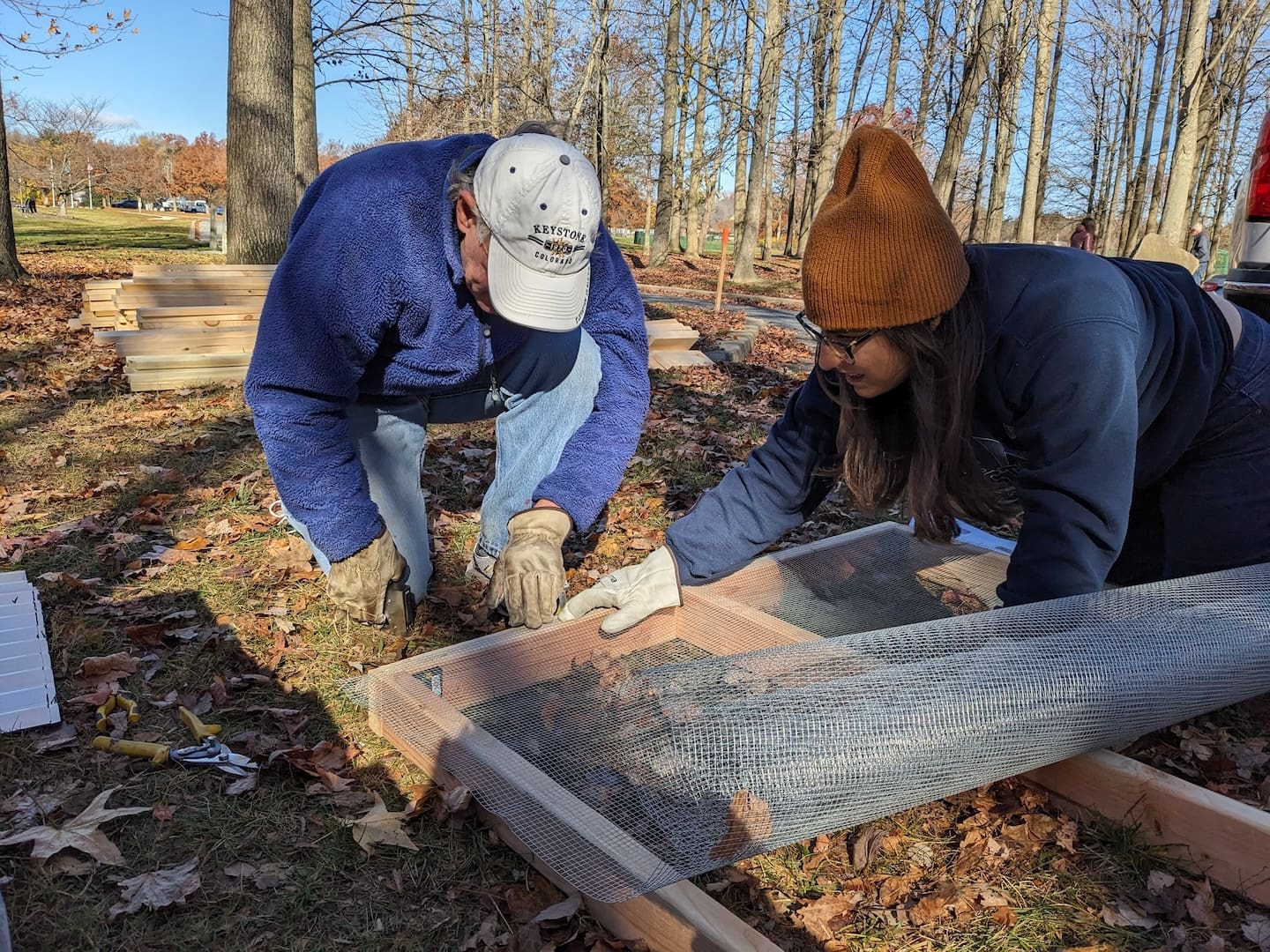

Brigid Gregory and Barry Evans work on the mesh that will keep out pests. (Ken Mammarella photo)
This funding goes toward infrastructure, member training materials, outreach and educational materials on food waste reduction and diversion, resources to help schools improve their waste reduction and diversion programs and Gregory’s contracted time. “I’m currently working with Wilmington Charter High School and Booker T. Washington Elementary on waste reduction pilot programs,” she said.
Plastic Free Delaware is also working to develop similar facilities at the Nest Play Cafe in Middletown, Wilmington Friends School in Alapocas and Frear Elementary near Camden.
“Composting is work to do well,” Gregory said.
That’s why members will start out with an hour of training, and they are asked to volunteer 1.5 hours a month at the facility to use a shovel to mix the materials, record pile temperatures, water the piles and handle other tasks. Or they can pay $47.70 a month to belong.
There’s an online form to apply. The facility is expected to open by early January.
There are limits on what is accepted: “only uncooked fruit and vegetable scraps, clean eggshells, coffee grinds with filters, untreated grass and plant material, straw, leaves, wood chips and broken-down sticks.”
Members are advised to store their scraps in the freezer, to lock in moisture and prevent odors and fruit flies.
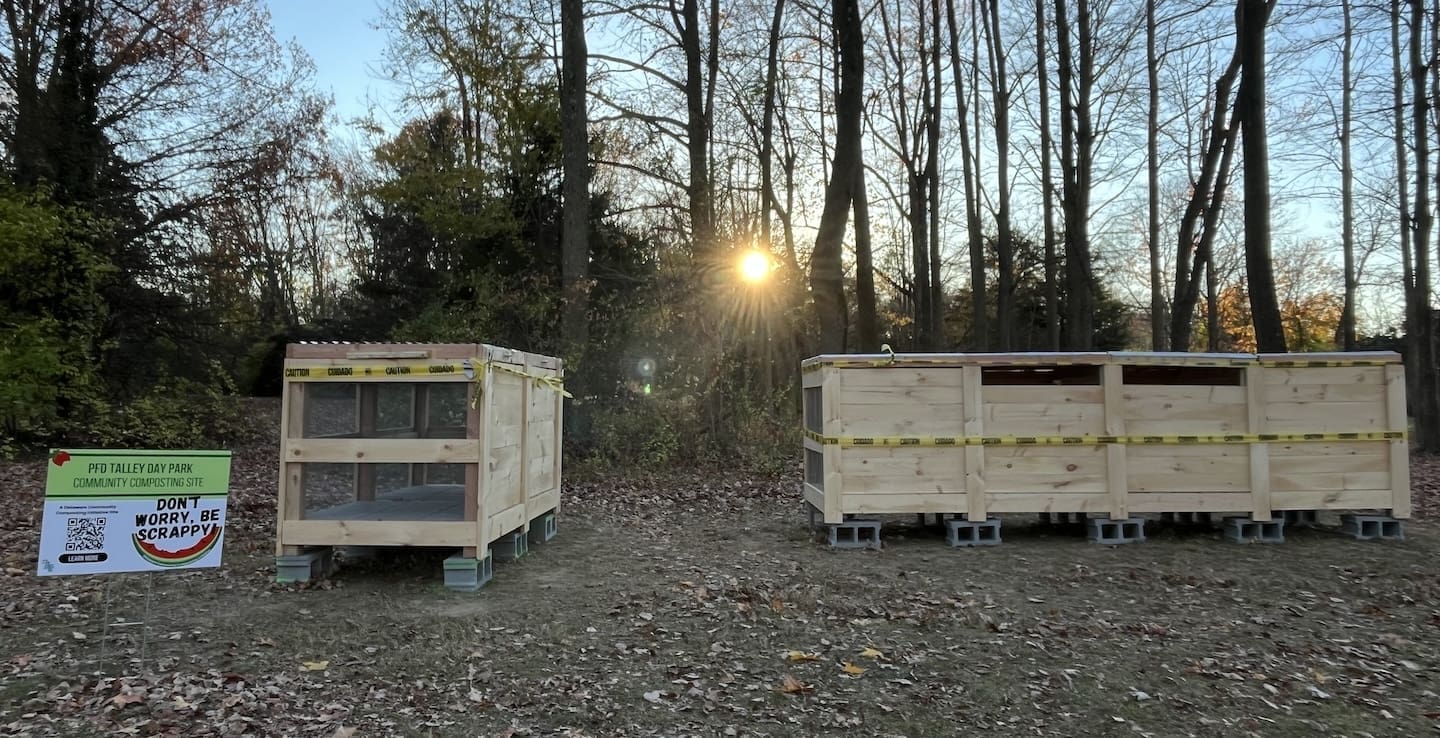

After two weekends of work, the facility is nearly done. (Courtesy of Brigid Gregory)
Composting is “the controlled decomposition of organic materials,” according to an organization fact sheet.
It involves covering “greens” (nitrogen-rich materials like food scraps) with “browns” (leaves and wood chips) to reduce odors and keep out pests.
Ideally, the stuff heats up, a process that kills bad things, and after several months of mixing, watering and monitoring, it turns into rich compost that members can take home to nurture their properties.
Any extra compost will be offered to the Friends of the Brandywine Hundred Library and the county for use on the site.
Durham, who lives in Centreville, said she plans to continue with WasteWell, a service that picks material for composting in northern New Castle County and southern Chester County.
Gregory is eager to use the new Talley Day facility.
“The site will provide our city-dwelling family of four a chance to divert all of our fruit and vegetable scraps, coffee grinds and eggshells,” she said. “I estimate that amounts to about 10-15 pounds a week.”
some info
Share this Post


